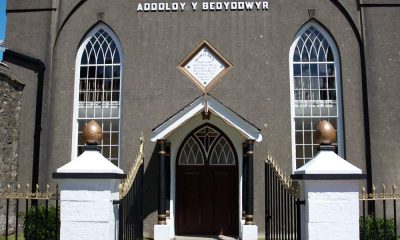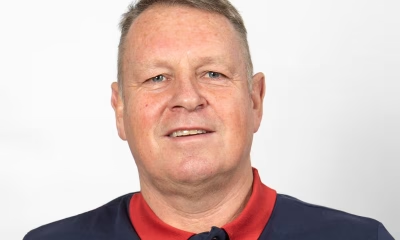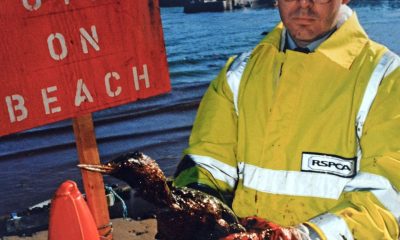News
GWR unveils Coronation train services to Swansea fit for a King!
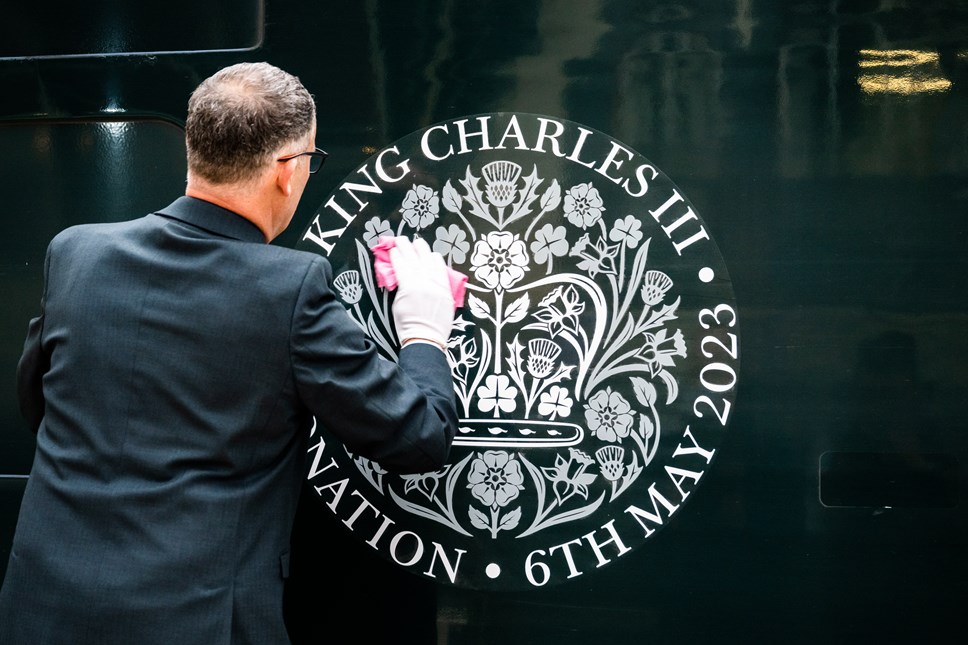
GWR has commemorated the Coronation in style with a named train service fit for a King!
The 0848 London Paddington to Swansea service has become known as the ‘Flying Carolean’ from today, with Intercity Express Train 802103 featuring King Charles III’s official Coronation logo along with its new name.

The logo and name was applied to the side of the train live on the platform at Paddington following its arrival from Cheltenham at 0759.
The ‘Flying Carolean’ then departed to Swansea at 0848. After it reached its end destination in Wales, the Coronation logo and Welsh name ‘Y Carolean Hedegog’ was applied to the opposite side of the train.

‘Carolean’ refers to the name Charles and marks the new Carolean era, while GWR chose one of its Paddington to Swansea services to pay homage to the King’s 59 years as the Prince of Wales.
Rail Minister Huw Merriman, who helped to unveil the Coronation logo, said: “This tribute will take pride of place on our railway as we approach the Coronation celebrations and pay our gratitude to the King.
“It’s an honour to unveil the sign today and particularly fitting it will adorn a service to Wales – a country both His Majesty and Great Western Railway have served for many years.”
GWR Managing Director Mark Hopwood said:“We’re incredibly excited about the Coronation and have been working hard to ensure we have everything in place to carry passengers in and out of London.
“We want to pay our own special tribute to King Charles III and name a train service which not only reflects the new Carolean era, but also celebrates his long association with Wales, where we are incredibly proud to serve as part of the GWR network.”
Network Rail Interim Western Route Director, David Davidson, said:“We’ve been working closely with our train partners and others to prepare for the Coronation weekend. We’ve decked out Paddington station, have volunteers on hand across our stations and will be doing everything possible to give passengers a great experience this weekend.”
GWR is providing additional trains and extra carriages for the King’s Coronation but advises those travelling to allow plenty of time for their journeys.
With around 1.2 million people expected to line the streets of London on Saturday 6 May for the procession to Westminster Abbey, GWR will provide extra very early morning trains from South Wales, Devon and Cornwall, as well as in London and the Thames Valley, to take customers into central London. An hourly, overnight service is being provided tomorrow into Saturday.
GWR will also operate as many trains as possible on the Windsor branch line, between Slough and Windsor, for ticket holders to the Coronation Concert at Windsor Castle on Sunday. Three services will run per hour, with an extra carriage providing an increased 33% capacity per journey.
Up to 30,000 people are expected to attend the concert within the grounds of the castle. Once again, GWR will operate extra late night/early morning services between Windsor and Slough and between London Paddington and Reading. Those travelling are being warned to expect to have to queue in the designated area to board trains safely.
News
Court ruling to decide fate of nearly 3,000 arrested under terror laws

Peaceful sign-holders face uncertainty as judges weigh legality of Palestine Action ban
A HIGH-stakes court ruling due on Friday (Feb 13) could determine whether nearly three thousand people arrested for holding protest signs were unlawfully treated as terror suspects.
Judges at the Royal Courts of Justice are expected to deliver a long-awaited Judicial Review decision into the Government’s decision to proscribe Palestine Action, a direct-action group campaigning against arms companies linked to Israel.
Campaigners say 2,787 people were arrested across the UK for peacefully displaying placards reading: “I oppose genocide. I support Palestine Action.”
They argue those arrests – made under terrorism legislation – represent one of the most sweeping crackdowns on non-violent protest in modern British history.
Supporters from Defend Our Juries and its “Lift The Ban” campaign say they will again hold signs outside the court from 10:00am, even if that risks further arrests.
If the ban is ruled unlawful, lawyers say hundreds of pending prosecutions could collapse.
If upheld, more demonstrators could face criminal charges.
A spokesperson for the group said: “The public knows the difference between protest and terrorism. Peaceful people holding signs should never have been treated as extremists.”
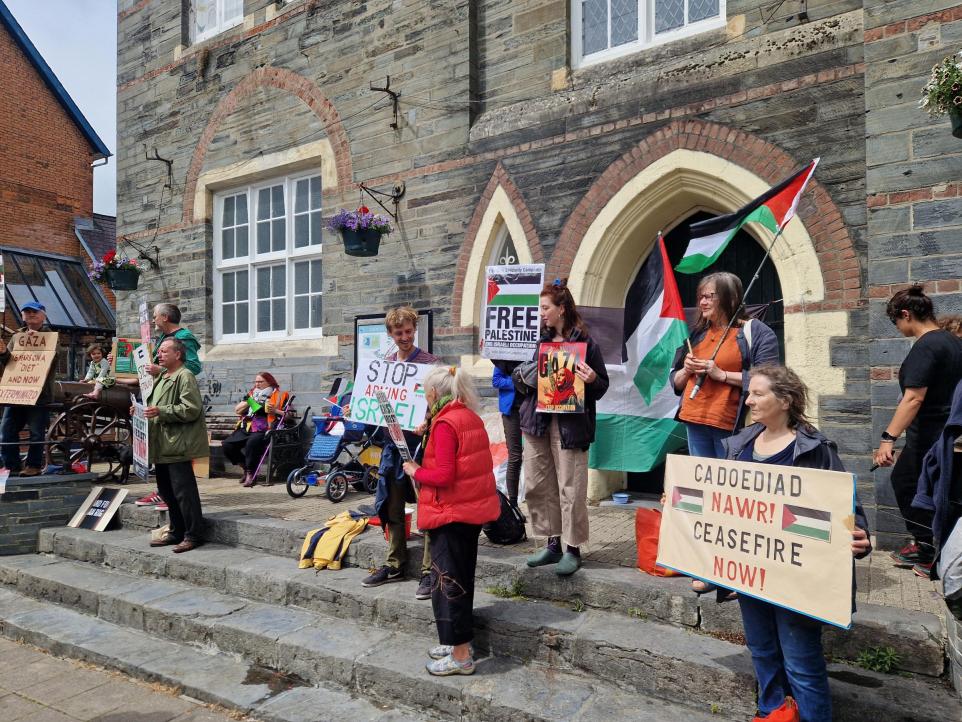
Largest civil disobedience campaign
Organisers describe the protests as the largest UK-wide campaign of non-violent civil disobedience in recent years, with silent vigils held in towns and cities across England, Wales, Scotland and Northern Ireland.
They claim counter-terrorism resources have been diverted away from genuine threats to process peaceful demonstrators instead.
Police morale has also been affected, they say, with officers placed in the position of arresting people engaged in silent protest.
Government under pressure
The proscription was introduced by Home Secretary Yvette Cooper, who argued the group’s actions crossed the line into criminality.
But critics allege the decision followed lobbying from arms manufacturers and pro-Israel interests, a claim ministers deny.
A recent Channel 4 News documentary examined meetings between ministers and industry representatives, raising further political questions.
Prime Minister Keir Starmer has also faced scrutiny over the Government’s stance after campaign actions targeted property linked to him in Scotland.
Rights concerns
Human rights organisations say the case could set an important precedent for the future of protest laws.
Amnesty International UK warned the ban marked “a substantial departure” from how protest movements are normally handled, while Liberty argued counter-terror powers were historically intended for groups using violence against people.
United Nations experts have also raised concerns that criminalising peaceful assembly risks putting the UK “out of step” with other democracies.
Legal battle
The Judicial Review challenge, brought by Palestine Action co-founder Huda Ammori, was granted four grounds, including whether the ban breaches rights to freedom of expression and assembly and whether ministers failed to follow proper consultation procedures.
Parts of the Government’s defence were heard in secret under a closed material procedure, a move criticised by civil liberties lawyers.
Campaigners have described the court hearing as a test of whether protest can still be treated as a democratic right.
What happens next?
The ruling, expected mid-morning, could immediately reshape ongoing cases.
If the judges strike down the proscription, arrests and charges linked solely to sign-holding protests may be deemed unlawful.
If they uphold it, campaigners say they will continue demonstrating regardless.
One organiser said: “Whatever the decision, people of conscience will keep standing up. Holding a sign is not terrorism.”
The outcome is likely to be closely watched not only by those arrested, but by campaigners, police forces and civil liberties groups across the UK.
Health
NHS workers to receive 3.3% pay rise – union says award ‘timely but not enough’
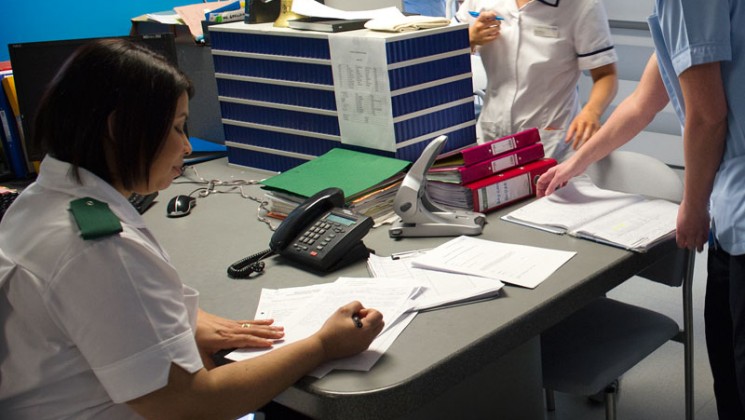
HEALTH staff across Wales and the rest of the UK are set to receive a 3.3 per cent pay rise from April after the Government accepted the latest recommendations from the independent review body – but unions say the increase still falls short after years of falling real-terms wages.
The decision follows months of pressure from unions representing nurses, paramedics, porters and other frontline staff, many of whom have taken industrial action in recent years amid rising workloads and the cost-of-living crisis.
The Health Secretary has confirmed that ministers will implement the headline award recommended by the NHS Pay Review Body for workers in England, Wales and Northern Ireland, meaning most staff covered by the Agenda for Change contract will see their salaries rise at the start of the new financial year.
Union leaders say the timing is welcome – but the figure itself does not go far enough.
Responding to the announcement, GMB Trade Union said the increase marks the first time in several years that NHS staff will receive their pay award on schedule, avoiding the delays that have previously left workers waiting months for back pay.
Rachel Harrison, national secretary for the union, said: “GMB welcomes the efforts made to ensure NHS workers will receive their pay increase when it is due, in April.
“The first time this will have happened in years.
“But this award is just not enough to make up for more than a decade of pay cuts under the Tories. NHS workers deserve more and GMB will fight for that at the long overdue Agenda for Change structural talks we have now been promised.
“GMB reps will now meet to discuss the pay award and determine next steps.”
Years of pressure
Health unions argue that although pay has risen in cash terms, inflation and years of below-inflation settlements have left many National Health Service workers worse off than they were a decade ago.
Since 2010, a combination of pay freezes, capped rises and soaring living costs has eroded real-terms earnings, with some estimates suggesting experienced staff are thousands of pounds a year worse off compared to pre-austerity levels.
Recruitment and retention remain major concerns across Welsh hospitals and ambulance services, with health boards continuing to rely on agency staff to plug gaps.
Union representatives say pay remains one of the biggest factors pushing experienced workers to leave the profession.
Impact in Wales
For NHS staff in west Wales, including Pembrokeshire and Carmarthenshire, the award will be felt from April payslips, covering a wide range of roles from healthcare assistants and cleaners to nurses, paramedics and administrative teams.
While some will welcome the certainty of an on-time rise, local staff have previously told The Herald that rising energy bills, fuel costs and housing pressures mean even modest increases are quickly swallowed up.
GMB said it will now consult workplace representatives on whether further action is needed and will push for wider reforms during upcoming structural talks on pay bands and career progression.
The union added that “timely” must not be confused with “sufficient”.
For many on the frontline, the question is no longer just when pay rises arrive – but whether they are enough to keep the health service staffed at all.
News
Angle RNLI launches twice in busy start to week
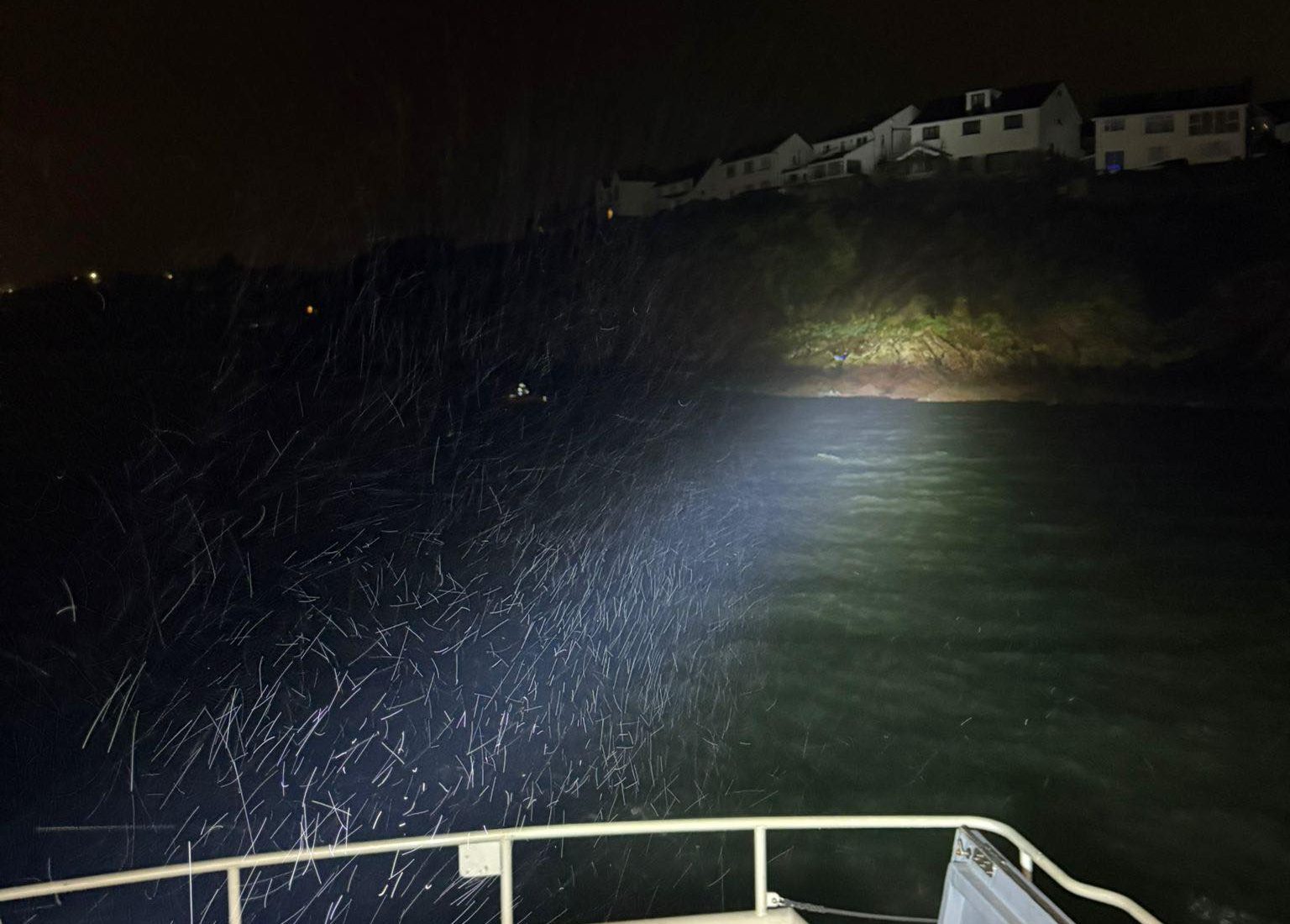
Teenagers rescued from rocks as late-night tide trap sparks call-out
ANGLE lifeboat crew have responded to two emergency shouts this week, including a late-night rescue of three teenagers cut off by the tide.
Volunteers from RNLI Angle Lifeboat Station were first tasked at 6:23pm on Tuesday (Feb 10) to assist in the search for a missing surfer at Broughton Bay, on the Gower.
With Burry Port Lifeboat Station inshore lifeboats also responding and other all-weather lifeboats in the area unavailable, Angle’s crew began mustering for immediate launch.
However, the shout was cancelled before the lifeboat launched after the surfer was located safe and well.
Just two days earlier, at 11:24pm on Monday (Feb 8), the crew had launched to reports of three teenagers stranded between Hakin Point and Conduit Beach after becoming cut off by the incoming tide.
The lifeboat quickly located the group on rocks made slippery and hazardous by heavy rain. Unable to climb to safety, the teenagers were stranded as the tide rose around them.
The crew deployed the station’s inflatable Y-boat, allowing rescuers to reach the casualties and transfer them safely back to the all-weather lifeboat.
They were then brought a short distance into the marina and handed into the care of family members, alongside HM Coastguard Dale Coastguard Rescue Team and police.
With no further assistance required, the crew stood down and the lifeboat was refuelled and made ready for service again by 1:00am.
RNLI volunteers are reminding the public to check tide times and sea conditions before heading onto the coast, particularly during the winter months when weather and visibility can deteriorate quickly.
-

 Health1 day ago
Health1 day agoHealth Board to decide future of nine key services at two-day meeting
-

 Business3 days ago
Business3 days agoComputer Solutions Wales under fire from customers
-

 Business6 days ago
Business6 days agoSix-figure negligence victory leaves retired builder trapped in divorce limbo
-

 Business5 days ago
Business5 days agoMinimum alcohol price to rise by 30 per cent as retailers warn of border impact
-

 Community2 days ago
Community2 days agoFacebook ‘news’ site targeting Herald editor collapses after community backlash
-

 Charity3 days ago
Charity3 days agoWelsh patient voices help shape new UK-wide online kidney forum
-
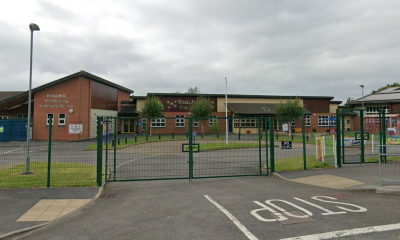
 Education6 days ago
Education6 days agoSecond west Wales school placed in lockdown within days
-
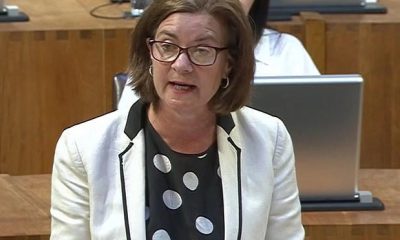
 News7 days ago
News7 days agoPolitical leaders and unions react to Milford Haven school assault












